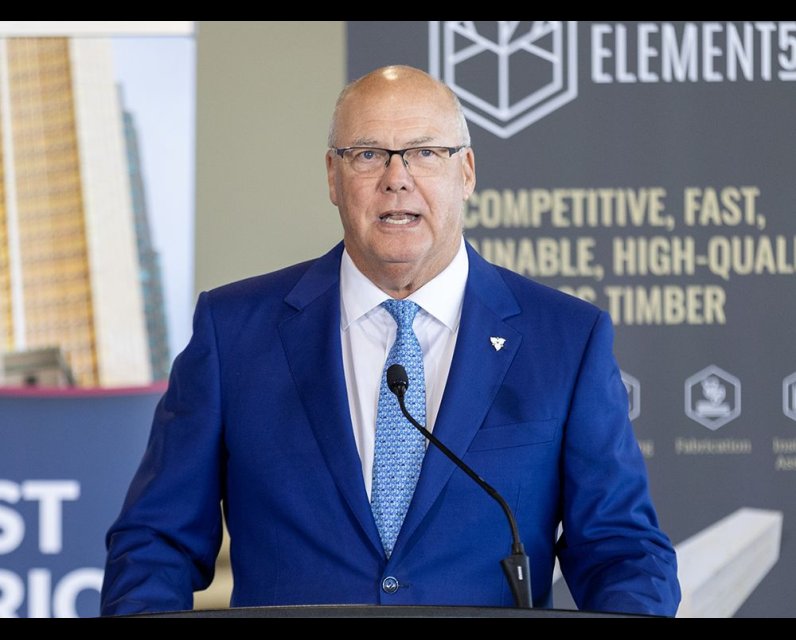Ontario to launch pilot project aimed at reducing dependence on housing development charges

The Ontario government is looking to reform the way that development charges are collected from homebuilders in a bid to get more homes built faster in Canada’s largest province.
On Thursday, Rob Flack, Ontario’s minister of municipal affairs and housing, announced the Fighting Delays, Building Faster Act.
The bill tackles a huge swathe of development and housing-related issues in the province, including streamlining approvals, ensuring a single, consistent building design standard and removing Toronto’s ability to require new builds to have a green roof. The bill also tackles other aspects of development, particularly around roadway construction, such as barring municipalities from reducing car and truck lanes in favour of bicycle lanes.
But for developers, one big future change, depending on the outcome of a pilot project launching in the Peel Region, could be to the development charges.
The bill will transfer jurisdiction over water and wastewater from Peel Region to the municipalities of Mississauga, Brampton and Caledon and create a new public corporation model for funding infrastructure costs.
“These changes would … provide broader financing opportunities to reduce reliance on development charges for water and wastewater growth-related infrastructure,” according to a technical briefing on the bill.
“Simply put, it takes too long and it costs too much to build infrastructure and homes in Ontario,” said Flack at a Thursday afternoon press conference. “We are changing this today.”
National Post spoke to Flack about the changes and what they’ll mean. This interview has been edited and condensed for clarity and length.
What is happening with development charges?So, development charges have been building up for decades. It started off to pay for infrastructure, and now it’s become a punitive cost in terms of getting a home built. I have met with literally hundreds of home builders this summer throughout the province, and what I’ve heard time and time again is that it costs too much and it takes too long to build a home, and part of the “cost too much” are these inflated development charges, and we’re working closely with municipalities to get them lowered.
In Bill 17 (the Protect Ontario by Building Smarter and Faster Act, which passed in June), development charges got postponed until occupancy. We eliminated them for the long-term care homes. What we’re doing now is taking a further look at getting them reduced.
There’s a pilot project happening in the Peel region, too. Tell me about that.Really what it is, is getting a municipal service corp. in place to help fund the over $200 billion of infrastructure we need — water and wastewater. In this province, we need close to $250 billion to replace aging infrastructure and new infrastructure. Without the infrastructure, you don’t build homes. But if you charge the development charge on the new home buyer, growth no longer pays for growth, it makes the affordability of a new home too much.
So, what we’re going to do is set up this pilot project, and hopefully, over time, you can amortize the cost of this infrastructure. Municipalities can borrow from the service corporation and get the needed infrastructure in the ground.
This is a way, not unlike your power utility, that we can put in place to help fund the needed infrastructure, get more homes built faster.
Throughout the province, 31 per cent or more — I’m going low here, it goes up well into the 40s — of a new home construct comes from HST, development charges and the cost of studies, iterations to the building code. A third of the cost of a new home is related to these fees and taxes, and we have to lower them. And development charges is a big one. And I think the answer, or part of the answer, is to implement this municipal service corp. right across the province. We’ll get it in place for Peel Region, but when it works there, it’s going to be a model to use throughout the province.
Who would borrow from this municipal service corporation?It would be the municipality. And then then they could amortize it over decades. Like, right now, a development charge, a new homebuilder, they pay it all up front.
You buy a new home today, and you pay a big fat development charge. When prices are going up exponentially, you don’t see it, but now the prices have softened and you go to sell your houses in two or three years, you’re likely not going to get the value for that development charge back.
What we’re trying to do is amortize it over a longer period of time.
Where would the money come from to fund this municipal service corp. model?We’re in exploratory stages right now, but I think you’d see a lot of pension funds want to invest in this. It’s a conservative investment by them. It’s long term, it’s safe. It makes sense. There’s going to be people living in these homes. So, that’s where we see the bulk of the funding coming from, not necessarily government coffers. We don’t want to raise taxes to do this.
Municipal partners are looking forward too because, guess what? They don’t want to raise taxes. We don’t want to raise taxes. The feds don’t want to raise taxes. We’ve got enough tax, so let’s find another way. It’s got to be funded. People are going to ultimately have to pay for it, but let’s just find the best way to get it done.
What else is happening. There will be a standardized building code, right?No. 1, the code is king. There should be no iterations to the code. One standard across the province is what we want.
But in this bill, we’re also going to look at ways to improve or simplify the building code without ever compromising safety. I want to emphasize that. I also want to say we have a great building code in this province today. It works as long as there’s no iterations. In some cases, you’ve got municipalities that added to the building code in terms of what they require. We’re saying no more. You can’t do that. The code is king.
We’re also going to be launching a section-by-section review to see where efficiencies can be gained, cutting some red tape, but never at the expense of safety. I think it’s overdue. It’s time to do it.
Anything else we haven’t talked about?It costs too much, it takes too long to get homes built. And that is what we’re fighting, and we’re going to relentlessly march towards taking away those costly barriers, the red tape, to get more homes built faster. Because ultimately, what is the quintessential Canadian dream? It’s home ownership. Home ownership has to be in the sight of everyone who wants it. It can’t be a dream that’s abandoned. It has to be there. So we create the conditions to get homes built, let the builders do what they do best and build the homes. Our job is to create those conditions.
Our website is the place for the latest breaking news, exclusive scoops, longreads and provocative commentary. Please bookmark nationalpost.com and sign up for our daily newsletter, Posted, here.



Comments
Be the first to comment